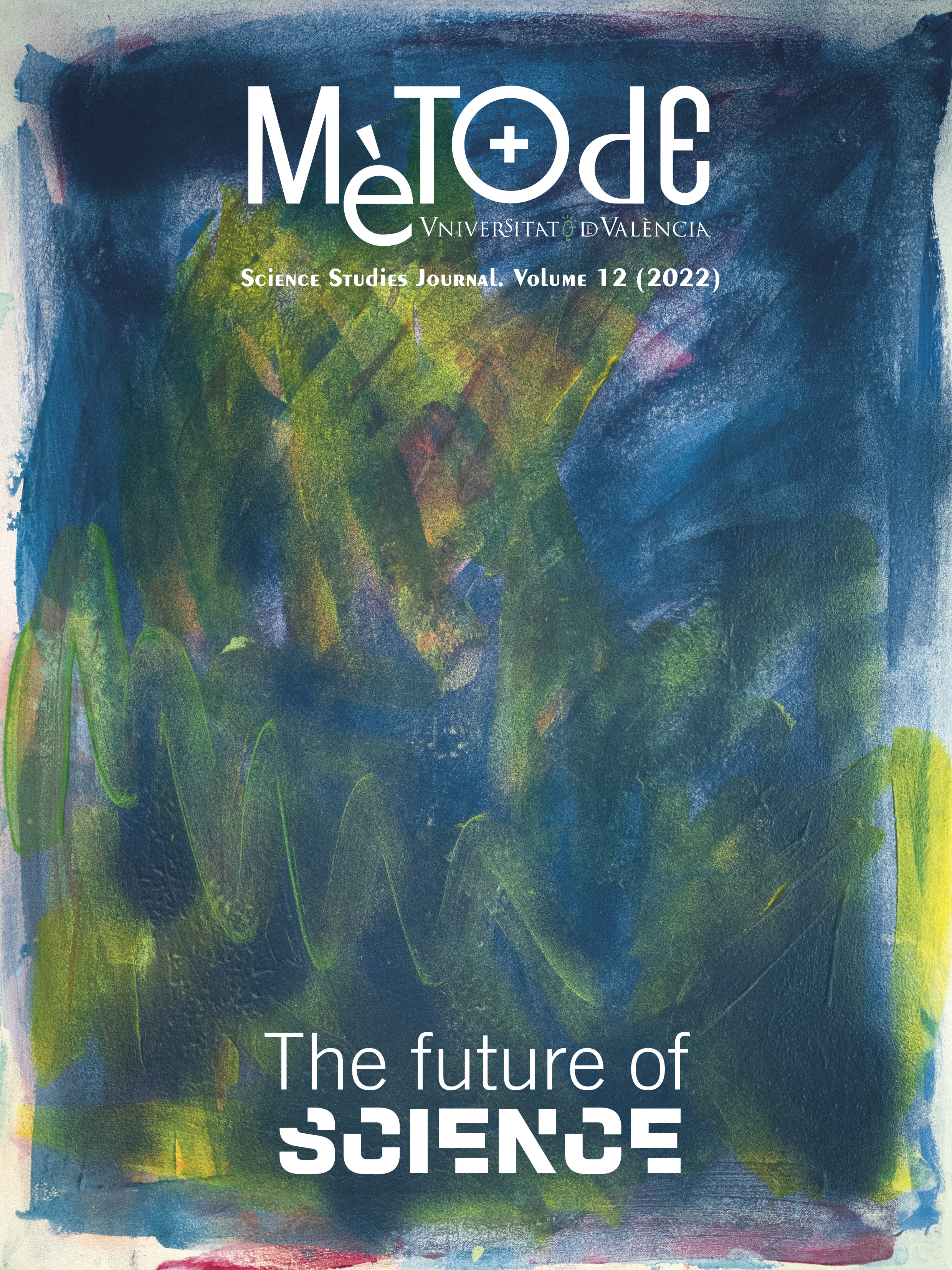Human enhancement and functional diversity: Ethical concerns of emerging technologies and transhumanism
DOI:
https://doi.org/10.7203/metode.12.20676Keywords:
transhumanism, human enhancement (HE), functional diversity, genome edition, future generations Abstract
Abstract
The concepts of posthuman, transhuman, transhumanism and human enhancement, and their use of emerging technologies, are described together with their scientific and social implications. Genome editing techniques for enhancement purposes, as well as their scientific, societal, and ethical drawbacks are specifically discussed. In particular, we focus on a perspective of personal and collective responsibility and social inclusion, considering all people, with their functional diversity or different abilities. Pros and cons of proposals for radical transformation as endorsed by transhumanism (genome editing), their impact on future generations and on subjects with functional diversity, and the need of a global ethical frame, are discussed.
 Downloads
Downloads
 References
References
Baltimore, D., Berg, P., Botchan, M., Carroll, D., Charo, R. A., Church, G., Corn, J. E., Daley, G. Q., Doudna, J. A., Fenner, M., Greely, H. T., Jinek, M., Martin, G. S., Penhoet, E., Puck, J., Sternberg, S. H., Weissman, J. S., & Yamamoto, K. R. (2015). A prudent path forward for genomic engineering and germline gene modification. Science, 348(6230), 36–38. https://doi.org/10.1126/science.aab1028
Baylis, F. (2019). Altered inheritance. Harvard University Press.
Check Hayden, E. (2016). Should you edit your children’s genes? Nature, 530(7591), 402–405. https://doi.org/10.1038/530402a
Cortina, A., & Serra, M. A. (Coord.). (2021). ¿Humanos o posthumanos? Singularidad tecnológica y mejoramiento humano. (3rd ed.). Fragmenta Editorial.
Franssen, T. (2014). Prometheus descends: Disabled or enhanced? John Harris, human enhancement, and the creation of a new norm. In M. Eilers, K. Grüber, & C. Rehman-Sutter (Eds.), The human enhancement debate and disability (pp. 161–182). Palgrave Macmillan. https://doi.org/10.1057/9781137405531_9
Gracia, D. (2015). Mejoramiento humano. ¿De qué estamos hablando? En C. Ortega Esquembre, A. Richart Piqueras, V. Páramo Valero, & C. Ruiz Rubio (Eds.), El mejoramiento humano (pp. 20–30). Comares.
Humanity+. (2021). FAQ. https://humanityplus.org/transhumanism/transhumanist-faq/
Kurzweil, R. (2001). The law of accelerating returns. https://www.kurzweilai.net/the-law-of-accelerating-returns
López de Mántaras, R. (2016). Algunas reflexiones sobre el presente y futuro de la inteligencia artificial. In A. Cortina & M. A. Serra (Coord.), Humanidad∞. Desafíos éticos de las tecnologías emergentes (pp. 89–103). Ediciones Internacionales Universitarias.
National Academies of Sciences, Engineering and Medicine. (2020). Heritable human genome editing. The National Academies Press. https://doi.org/10.17226/25665
Nuffield Council on Bioethics. (2018). Genome editing and human reproduction: Social and ethical issues. https://www.nuffieldbioethics.org/publications/genome-editing-and-human-reproduction
Palacios, A., & Romañach, J. (2006). El modelo de la diversidad. La bioética y los derechos humanos para alcanzar la plena dignidad en la diversidad funcional. Diversitas.
Petre, I. (2017). Future generations and the justifiability of germline editing. The Journal of Medicine and Philosophy, 42(3), 328–341. https://doi.org/10.1093/jmp/jhx003
Plomin, R., & von Stumm, S. (2018). The new genetics of intelligence. Nature Review Genetics, 19(3), 148–159. https://doi.org/10.1038/nrg.2017.104
Postigo Solana, E. (2019). Bioethics and transhumanism from the perspective of human nature. Arbor, 195(792), a507. https://doi.org/10.3989/arbor.2019.792n2008
Rehman-Sutter, C., Eilers, M., & Grüber, K. (2014). Refocusing the enhancement debate. In M. Eilers, K. Grüber, & C. Rehman-Sutter (Eds.), The human enhancement debate and disability (pp. 1–20). Palgrave Macmillan. https://doi.org/10.1057/9781137405531_1
Serra, M. A. (2016a). Mejoramiento humano en el tercer milenio. Mitos y realidades. In A. Cortina & M. A. Serra (Coord.), Humanidad∞. Desafíos éticos de las tecnologías emergentes (pp. 157–200). Ediciones Internacionales Universitarias.
Serra, M. A. (2016b). Tecnologías emergentes para uso clínico: Edición del genoma humano. Decisiones en el presente e impacto en las generaciones futuras. In A. Cortina & M. A. Serra (Coord.), Singulares. Ética de las tecnologías emergentes en personas con diversidad funcional (pp. 85–108). Ediciones Internacionales Universitarias.
UNESCO. (1997). Universal Declaration on the Human Genome and Human Rights. https://en.unesco.org/themes/ethics-science-and-technology/human-genome-and-human-rights
UNESCO. (2003). International Declaration on Human Genetic Data. https://en.unesco.org/themes/ethics-science-and-technology/human-genetic-data
UNESCO. (2005). Universal Declaration on Bioethics and Human Rights. https://en.unesco.org/themes/ethics-science-and-technology/bioethics-and-human-rights
Downloads
Published
How to Cite
-
Abstract1923
-
(Español)7
-
PDF1116
Issue
Section
License
![]()
All the documents in the OJS platform are open access and property of their respective authors.
Authors publishing in the journal agree to the following terms:
- Authors keep the rights and guarantee Metode Science Studies Journal the right to be the first publication of the document, licensed under a Creative Commons Attribution-NonCommercial-NoDerivatives 4.0 International License that allows others to share the work with an acknowledgement of authorship and publication in the journal.
- Authors are allowed and encouraged to spread their work through electronic means using personal or institutional websites (institutional open archives, personal websites or professional and academic networks profiles) once the text has been published.





